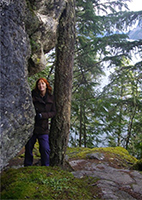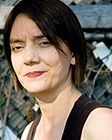Dig Out Your Best Truths! $1,000 Goes to One Winner

The Malahat's annual Creative Nonfiction Contest is now accepting submissions for the $1,000 grand prize!
Writers from around the world are invited to submit. Send us personal essays or memoirs, narrative nonfiction or travel writing... if it's real and creative, we want to read it!
Word count limit is 2,000 to 3,000 words. Entry fee varies by location, but comes with a nifty one-year subscription!
This year's contest judge is Brian Brett.
Submit your contest entry today.
Spring Issue Interview with Christine Lowther on CNF
 Christine Lowther explores the boundaries of creative nonfiction and poetry in "Not a Lake," published in the Malahat's Spring 2017 issue. In this interview with Malahat fiction-board member Micaela Maftei, Lowther broaches the life of water, be it lake or creek, sky or ground, as a story of assumption, mystery, and awakening. Christine Lowther explores the boundaries of creative nonfiction and poetry in "Not a Lake," published in the Malahat's Spring 2017 issue. In this interview with Malahat fiction-board member Micaela Maftei, Lowther broaches the life of water, be it lake or creek, sky or ground, as a story of assumption, mystery, and awakening.
MM: You're a poet as well as a writer of nonfiction. Would you say your process is different depending what type of writing you're doing? Have you ever had an image or a phrase that you initially felt "belonged" to one type of writing but later worked its way into another form? I'm curious if the two genres feel similar to you in terms of process, and whether the line ever becomes blurred in the end product.
CL: I'm stunned and grateful to be writing anything, at all, ever. Life gets in the way so much of the time. All writing is the recording and expression of what moves me. Composing poetry—if it's working—feels somehow more magical than prose. Vera Manuel said she was told by an elder that poetry is a gentle way to talk about painful things. Both genres require equal attention and sweat. Events that are only vaguely or dreamily remembered but made you who you are: these might be more accurately expressed in poetry than in prose.
Read the full interview with Christine Lowther on our site.
Spring Issue Interview with Sina Queyras on Poetry
 In "The Applicant" and "Stings," both appearing in the Malahat's Spring 2017 issue, Montreal author Sina Queyras dares to re-imagine poems with the same titles by the iconic, mid-twentieth-century poet, Sylvia Plath. Queyras' "re-writes" are drawn from My Ariel, forthcoming from Coach House Books later this year. Malahat poetry-board intern Celina Silva probes into this highly anticipated rethinking of Plath's final great work. In "The Applicant" and "Stings," both appearing in the Malahat's Spring 2017 issue, Montreal author Sina Queyras dares to re-imagine poems with the same titles by the iconic, mid-twentieth-century poet, Sylvia Plath. Queyras' "re-writes" are drawn from My Ariel, forthcoming from Coach House Books later this year. Malahat poetry-board intern Celina Silva probes into this highly anticipated rethinking of Plath's final great work.
CS: In your poem "The Applicant," the lines seem to hurl themselves onto the page and are quite epiphanic. As a response to the poem by Plath with the same title, how does your revision process work to achieve the same energy as your own version?
SQ: I'm glad you describe the poem in physical terms because I always want them to feel alive, moving and still becoming something after they are published. That has been difficult to achieve in this work because some of these poems feel like old thorns. Well, actually more than thorns, there is a certain amount of coming to terms with the many possible trajectories my life has had. I have two versions of "The Applicant" that I hope to include in the book—I haven't had final edits so we'll see what stays in.
Read the full interview with Sina Queyras on our site.
|